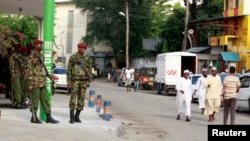With a political showdown looming Monday in Kenya’s capital, unease has settled there and through much of the country. Some government officials say they’ve beefed up security, while religious leaders are calling for calm.
Supporters of former Prime Minister Raila Odinga, who lost to Uhuru Kenyatta in a 2013 presidential bid, have planned a major rally in the capital city of Nairobi on July 7. It coincides with Odinga’s deadline for Kenyatta’s government to schedule a national forum on the country’s deteriorating economy, security and political climate.
Kenya has experienced a rash of violence linked to Islamist militants, sectarian backlashes and a crackdown on secessionists. Just last month, gunmen from the Somali rebel group al-Shabab stormed the coastal town of Mpeketoni, killing more than 60 people and torching properties worth millions.
A bloody history
The specter of violence goes back to the 2007 presidential election. Fighting that erupted among tribal groups left more than 1,100 dead and hundreds of thousands displaced.
Some groups, fearing new attacks, are leaving the conflict-prone Rift Valley, Kenyan news media report. The region experienced most of the political violence around the 2007 elections.
On Friday, Reuters reported that religious leaders in Kenya were trying to head off further bloody confrontations. Roman Catholic and Presbyterian leaders discouraged their members from attending political rallies. Anglican Archbishop Eliud Wabukala told the news agency that, “as churches, we have all united in asking for peace and for calm in the country."
The Anglican cathedral borders the Nairobi park where Monday’s rally is scheduled. In recent weeks, Odinga has crisscrossed the country and held rallies to push the government and change how it’s managed.
As Reuters reported, the religious leaders’ intervention could have a significant impact, because roughly half of Kenya’s 40 million people belong to churches.
In Mombasa, security officers are on high alert.
Police Commissioner Nelson Marwa said his forces will seriously deal with those who want to start chaos. "You cannot just sit back and watch criminals take over a system” and “kill innocent citizens,” Marwa said. “You act.”
After the 2007 election, police were accused of doing too little to protect civilians and stop the violence.
Now, Marwa said his officers are providing more security to vulnerable areas of Mombasa, especially poor areas with higher concentrations of unemployed young people.
"We feel certain areas in the country are already being given special emphasis,” he said. "Some of them are slum areas.
“It is easy to manipulate an unemployed person,” Marwa said. “You give him some small money, he takes to the street. That's why we are saying these are specific areas we should safeguard ensure that they are tight security there."
After the Mpeketoni attack, Kenyatta, the president, said the violence was ethnically motivated, despite al-Shabab having claimed responsibility.
The U.S. State Department relocated some of its embassy staff and issued travel warnings to Americans about the potential for terrorist attacks.
Lamu Governor Issa Timamy was arrested in connection with the Mpeketoni attack, charged with murder, terrorism and forceful eviction. A high court in Mombasa released him June 30 on a $57,000 cash bail.




